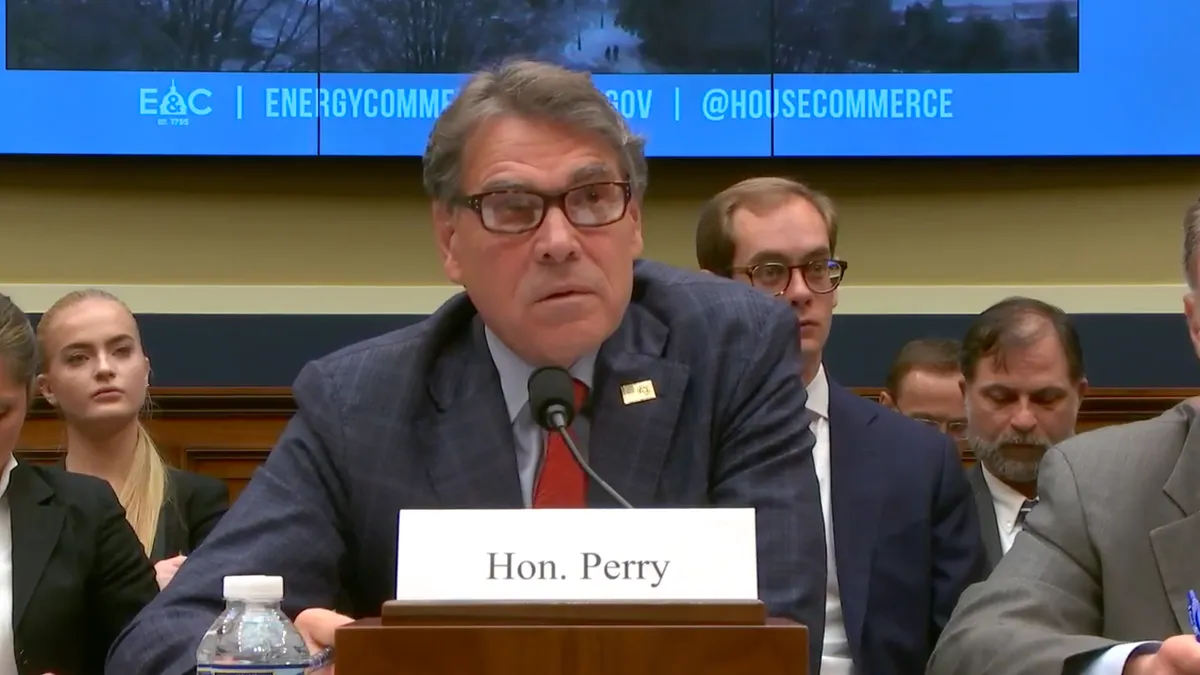Dive Brief:
-
The Department of Energy is “looking very closely” at using the Defense Production Act (DPA) to keep coal and nuclear plants from closing, Secretary of Energy Rick Perry told a House committee on Wednesday.
-
Perry said the decision is “about the national security of our country — of keeping our plants, all of them, online” in the event of an emergency. "Having resiliency and reliability in our grid is as important to our national security as anything I can think of," he said.
-
Sen. Joe Manchin, D-W. Va., pushed DOE to apply the DPA in April, weeks after generator FirstEnergy asked the agency to use its emergency powers to keep coal and nuclear plants in PJM online. A broad coalition of renewable energy and natural gas groups wrote to DOE on Tuesday saying it does not have the legal authority to apply either law.
Dive Insight:
Applying the Defense Production Act to keep coal and nuclear plants online could disrupt the nation’s wholesale electricity markets and raise prices for consumers, depending on the number of plants targeted.
Last year, the DOE asked the Federal Energy Regulatory Commission to approve financial support for coal and nuclear plants in the PJM interconnection. At the time, former regulators and independent analysts said moving a large number of plants into cost recovery could "blow up" the wholesale power markets.
That request was unanimously rejected by FERC, but the FirstEnergy and Manchin proposals to DOE could go further.
The generator in March asked DOE to support all coal and nuclear plants in PJM for four years under Section 202(c) of the Federal Power Act, which lets the agency keep plants online during emergencies like hurricanes or attacks.
Manchin’s letter, meanwhile, urged a broader commitment from the agency to consider using the DPA to “prevent the impending retirement of numerous coal-fired and nuclear power plants” he says are “critical to ensuring the resilience and reliability of our electric grid and the security of our nation.”
Perry picked up on those national security concerns in an appearance before the House Committee on Science, Space and Technology on Wednesday.
"The 202(c) is an economic issue," Perry said. "That’s approaching this from an economic standpoint and I think ... it’s about the national security of our country, of keeping our plants, all of them, online, being able to deliver energy” in the event of an emergency.
Perry said DOE is “looking at a number of ways” to address the national security issue. “I know the [DPA] is one of those ways to address [it] that we’re looking at very closely as well.”
Perry’s framing of the coal and nuclear bailouts as a national security issue could be significant. In February, one of his deputies declared DOE “would never use” a 202(c) order to support uneconomic generators. Perry, however, said later in April that DOE did not consider economics to be “the issue” in the FirstEnergy request, instead focusing on the national security concerns.
Addressing those concerns will involve "making sure the plants we have today are supported reliably with the fuel," Perry said Wednesday. "Obviously nuclear is one of those and there are coal plants out there that fit into that."
Perry’s perspective clashes with those of regional grid operators and the North American Electric Reliability Corporation, which all say grid reliability is not at risk today. Last week, PJM, the focus of the FirstEnergy request, reported that not only is reliability secure, the broader subject of generator fuel security is not expected to be an issue for years to come.
“We don’t think there's an emergency today,” PJM CEO Andy Ott said in announcing a new initiative to value fuel security in its wholesale market.
The DPA, a 1950s law that allows DOE to nationalize energy infrastructure in wartime, has never been used in the way Manchin envisions, energy lawyers say. Absent a pressing emergency, companies outside the coal and nuclear sector argue DOE lacks the legal authority to deploy it.
“[The DPA] gives the government the extraordinary power to force private actors to sell their products to the government (or its contractors) when those private actors are contractually committed to sell to other parties,” a coalition of eight energy trade groups wrote to DOE Tuesday. “But nothing in the Act would authorize the far greater intrusion of forcing private actors to make purchases against their will, even if such purchases were somehow shown to ‘promote the national defense’ or to ‘maximize domestic energy supplies.’”
A DOE spokesperson said the agency still has no timeframe to make a decision on the FirstEnergy and Manchin requests, but during the hearing Perry sought to reassure lawmakers that the agency would ultimately take some action to support coal and nuclear plants.
“I’m looking for a solution. I’m looking for results,” he said. “Process kind of wears me out from time to time."













